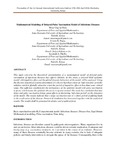| dc.description.abstract | This study concerns the theoretical determination of a mathematical model of delayed pulse
vaccination of infectious diseases that affects children. In this study, a delayed SEIR epidemic
model with impulsive effect and the global dynamic behaviors of the model will be analyzed. Using
the discrete dynamical systems determined, it’s shown that there exists an ’infection-free’ periodic
solution which is globally attractive when the period of impulsive effect is less than some critical
value. The sufficient condition for the permanence of the epidemic model with pulse vaccination
is given, which means the epidemic disease is to spread around. The study has concluded that time
delay and pulse vaccination brings great effects of shortening ‘infection period’ on the dynamics
of the model. The results indicate that a large vaccination rate or a short period of pulsing leads
to the eradication of the disease. Numerical simulation has been used together with the analytical
results. The results shall be presented in tabular and graphical form.
Keywords:
Basic reproduction ratio-Ro,Compartmental model, Infectious diseases, Disease-free, Equilibrium
Mathematical modeling, Pulse vaccination, Time delay | en_US |

